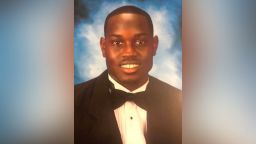Editor’s Note: Nadia Neophytou is a journalist from South Africa, based in New York, where she runs marathons when she’s not writing and reporting on arts and entertainment stories. She also interviews people she admires on the run – literally – in a video series called The Rundown. Follow her on Twitter @NadiaNeophytou and Instagram @NadiaNeo. The views expressed here are hers. Read more opinion on CNN.
Ahmaud Arbery, a former high school football player and an avid runner, would have turned 26 years old on Friday. His alleged killers remained free, neither detained nor charged, for two months after his death. Authorities arrested two men Thursday and charged them with murder and aggravated assault, two days after a short video appearing to show the deadly confrontation surfaced online and in the wake of a massive public outcry that included tweets from LeBron James and Taylor Swift.

Like many other runners and supporters around the world, I ran 2.23 miles in his name on Friday. But the miles I have run to commemorate Arbery’s life carry the weight and shame that his death, as a black man, in broad daylight, on a Sunday in February earlier this year, may not have received anywhere near the attention it has, had it not been for leaked video footage that seems to show what happened to him in the last moments of his life.
As a devoted runner, who is a white woman, my safety and that of others like me has been discussed, analyzed, researched and campaigned for. But what about the safety of men like Arbery, who we know face the very real fear that running while black can prove fatal? One of the men who authorities say pursued him in the middle-class Georgia neighborhood where he was killed, a retired investigator for the Brunswick County district attorney, told police that he saw Arbery “hauling ass.” Arbery was likely “hauling ass” because, as his family has since told us, he loved running.
And now he is dead.
Runners are being asked to run with masks on in the midst of this coronavirus pandemic. What does this mean for the safety of other black men who are out there running?
The safety of women runners has long been the subject of news articles, think pieces and panel discussions. We ask men to be allies and help protect women runners in whatever way they can. And yet, even though we know black men in this country are targets for police aggression and so-called civilian vigilantism, we don’t talk enough about the safety of black men running.
After the arrests Thursday, the NFL Players Coalition, a group of athletes devoted to social justice, sent a letter – from former wide receiver Anquan Boldin and signed by 63 current and former players, including Tom Brady, Malcolm Jenkins and Julian Edelman – requesting a “prompt investigation by the FBI and the Department of Justice’s Criminal Section of the Civil Rights Division into the tragic death of Ahmaud Arbery.”
These athletes are right to demand greater resources and attention in this case. For too long, there has been inaction, a silence that hasn’t been penetrated.
The reaction from officials to the deaths of young white women killed while running stands in stark contrast to the initial handling of Arbery’s killing. For example, in 2019 Karina Vetrano’s killer received a life sentence without parole for her murder in 2016. In 2017 a suspect in Vanessa Marcotte’s case was arrested after a massive manhunt and tip-line was set up the day after her 2016 murder. In Mollie Tibbetts’ case, a man allegedly confessed to killing her after a reward was offered for any information into her disappearance in 2018. Soon after all of their deaths, these women’s murders were investigated. Resources and attention were rightly brought to bear.
I have run miles in their names too. Years later, I am still deeply saddened and disturbed by their killings. Vetrano was 30 years old when she was sexually assaulted and strangled to death, while running in Spring Creek Park in Howard Beach, Queens, in New York City. Marcotte, who was 27, had been visiting her mother in Princeton, Massachusetts, when she went for a run and was brutally killed in the woods, less than a week after Vetrano. Tibbetts was a 20-year-old student out for a routine evening run in her hometown of Brooklyn, Iowa, when she went missing.
These cases have not been without their missteps, and I cannot imagine how frustrating that has been for the women’s families. But these women’s deaths instantly made headlines around the country, and manhunts were set up for their perpetrators, with no suspicion cast on the victims. Instead, the stories of their lives highlighted the ongoing issue of safety for women runners.
But what such humanizing stories are we not hearing when it comes to black men running? Runners, like Arbery, are stereotyped as the danger? Many black-male-led running groups are trying to change this, from Run Dem Crew in London to District Running Collective in DC. Still, the co-founder of the group Black Man Running, Rendell Smith once told WUNC radio station in North Carolina that a white woman was so scared when she saw him jogging toward her, she dropped her groceries and turned to run away from him.
Smith co-founded the Wilmington-based group to shift how people view black men in public spaces. Deeply held stereotypes have a deeply felt impact. The dynamics of racial profiling play out in a public space, and there are personal restrictions I, as a white woman, will never know about when going about my daily run.
One of the reasons I love running so much is that it unites people of different backgrounds; it has the power to bring communities together. But dynamics that I sometimes don’t even think about make running as a black man different from running as a black woman, and different from running as a brown person.
Indeed, other white runners, professionals like Sara Hall and Kara Goucher have expressed their anger over Arbery’s killing, with Hall tweeting: “I can’t imagine living in fear of being gunned down while doing the simplest things, like going for a run in the morning,” while Goucher said she couldn’t “wrap (my) head around this. Jogging. Something I do everyday. I have NEVER feared someone shooting me because I ‘look like a burglar.’”
The “Runner’s World” editors say they, too, have been doing soul-searching, asking themselves, “How can white runners enjoy the sport without fear, while black runners are treated with suspicion and face violence? Why does the media rush to cover the deaths of white runners, while the killings of black runners are left unnoticed for months?”
But we can no longer say we are surprised by these crimes. I need to acknowledge the privileges and affordances I have, as a white woman running. My hope is that other white runners will too. It’s time we did more than sign a petition or lace up in someone’s name to change this.



